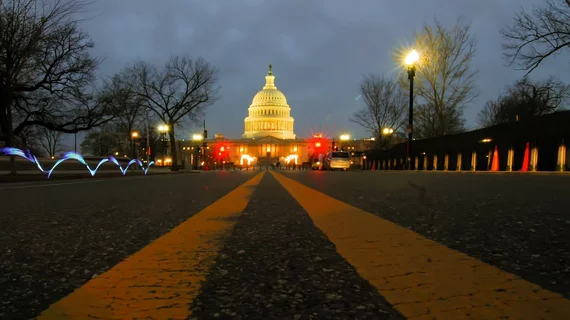Physician lawmakers introduce fix for ‘outdated’ Medicare payment system, drawing radiologist praise
A bipartisan group of physician lawmakers have proposed legislation to fix what they say is an outdated Medicare payment system that’s threatening patients’ access to care.
House representatives first introduced the Strengthening Medicare for Patients and Providers Act on April 6, drawing praise from the American College of Radiology and other professional associations. The bill proposes to provide a permanent annual inflationary physician payment update tied to the Medicare Economic Index.
Doc groups have long championed such a change. When adjusting for inflation in practice costs, Medicare physician payments have actually declined by 26% since 2001, the American Medical Association estimates. Failing to take action will result in further consolidation, physician burnout, and medical practice closures, members of Congress contended.
“I am deeply concerned about the impact the outdated Medicare physician payment rate is having on healthcare access for my constituents,” Rep. Raul Ruiz, MD, D-Calif., who previously practiced in emergency medicine, said in a statement. “That is why I am announcing legislation that will move us away from a system where every year seniors’ access to care is threatened due to uncertainty over potential cuts.”
The proposal comes after the Medicare Payment Advisory Commission just recently recommended a physician payment update tied to half of the economic index. ACR, the Society of Interventional Radiology and more than 130 other professional groups also wrote to leaders of the House and Senate in March, asking them to address lagging pay rates.
“As the only major fee schedule without a built-in inflationary update, Medicare reimbursement for providers billing under the MPFS has failed to keep pace with the true cost of practicing medicine,” the college said in an April 6 news update praising HR 2474, later adding: “The ACR will continue to advocate for short- and long-term payment stability for our members and the patients they serve.”
“We are deeply worried that many practices will be forced to stop taking new Medicare patients—at a time when access to care is already inadequate,” AMA President Jack Resneck Jr., MD, said in a separate statement. “Congress often waits until problematic situations become full-fledged crises. Members need to hear from their hometown physicians that we are nearing a crisis. Congress needs to pass this bill stat.”
Others sponsoring the legislation included Reps. Larry Bucshon, MD, R-Ind., Mariannette Miller-Meeks, MD, R-Iowa, and Ami Bera, MD, D-Calif.

